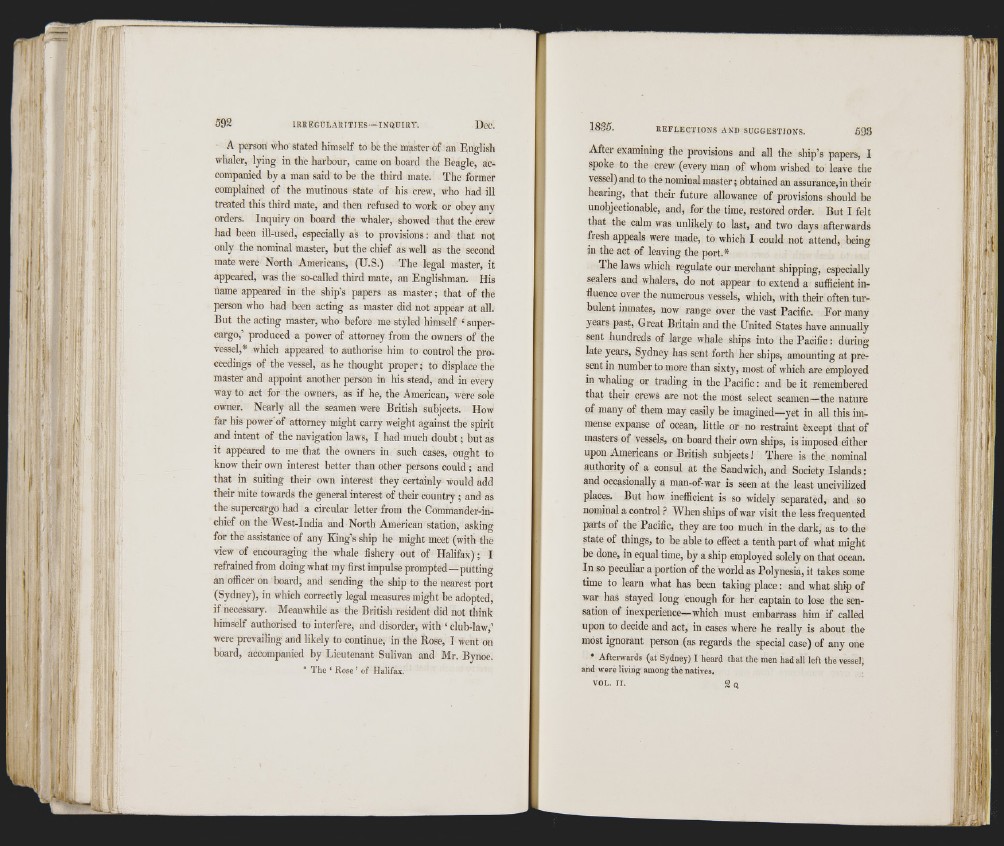
- f
• =■
7
■ [ '
0 « Î i f i
\J , '
i i ' J ü
^ i
;i
i 7 H î
! ..ai i'V i
ii L
[
7 ri.
1
i i ;
l. ? i
4 i '
' ‘ i
'^m :í
f 4 i“ 4:
ï ’ f ' ' ' l a -
fc.f la
592
A person who stated himself to be the master of an English
whaler, lying in the harhour, came on board the Beagle, accompanied
by a man said to be the third mate. The former
complained of the mutinous state of his crew, who had ill
treated this third mate, and then refused to work or obey any
orders. Inquiry on board the whaler, showed that the crew
had been iU-used, especially as to provisions: and that not
only the nominal master, but the chief as well as the second
mate were North Americans, (U.S.) The legal master, it
appeared, was the so-called third mate, an Englishman. His
name appeared in the ship’s papers as master; that of the
person who had been acting as master did not appear at all.
But the acting master, who before me styled himself ‘ supercargo,’
produced a power of attorney from the owners of the
vessel,* which appeared to authorise him to control the proceedings
of the vessel, as he thought proper; to displace the
master and appoint another person in his stead, and in every
way to act for the owners, as if he, the American, were sole
owner. Nearly aU the seamen were British subjects. How
far his power'of attorney might carry weight against the spirit
and intent of the navigation laws, I had much doubt; but as
it appeared to me that the owners in such cases, ought to
know their own interest better than other persons could ; and
that in suiting their own interest they certainly would add
their mite towards the general interest of their country ; and as
the supercargo had a circular letter from the Commander-in-
chief on the West-India and North American station, asking
for the assistance of any King’s ship he might meet (with the
view of encouraging the whale fishery out of Halifax) ; I
refrained from doing what my first impulse prompted—putting
an officer on board, and sending the ship to the nearest port
(Sydney), in which correctly legal measures might be adopted,
if necessary. Meanwhile as the British resident did not think
himself authorised to interfere, and disorder, with ‘ club-law,’
were prevailing and likely to continue, in the Rose, I went on
board, accompanied by Lieutenant Sulivan and Mr. Bynoe.
* The « Rose ’ of Halifax.
After examining the provisions and all the ship’s papers, I
spoke to the crew (every man of whom wished to leave the
vessel) and to the nominal master ; obtained an assurance, in their
hearing, that their future allowance of provisions should be
unobjectionable, and, for the time, restored order. But I felt
that the calm was unlikely to last, aud two days afterwards
fresh appeals were made, to which I could not attend, being
in the act of leaving the port.*
The laws which regulate our merchant shipping, especially
sealers and whalers, do not appear to extend a sufficient influence
over the numerous vessels, which, with their often turbulent
inmates, now range over the vast Pacific. For many
years past. Great Britain and the United States have annually
sent hundreds of large whale ships into the Pacific : during
late years, Sydney has sent forth her ships, amounting at present
in number to more than sixty, most of which are employed
in whaling or trading in the Pacific; and be it remembered
that their crews are not the most select seamen—the nature
of many of them may easily be imagined—yet in aU this immense
expanse of ocean, little or no restraint èxcept that of
masters of vessels, on board their own ships, is imposed either
upon Americans or British subjects ! There is the nominal
authority of a consul at the Sandwich, and Society Islands :
and occasionally a man-of-war is seen at the least uncivilized
places. But how inefficient is so widely separated, and so
nominal a control ? When ships of war visit the less frequented
parts of the Pacific, they are too much in the dark, as to the
state of things, to be able to effect a tenth part of what might
be done, in equal time, by a ship employed solely on that ocean.
In so peculiar a portion of the world as Polynesia, it takes some
time to learn what has been taking place : and what ship of
war has stayed long enough for her captain to lose the sensation
of inexperience—which must embarrass him if called
upon to decide and act, in cases where he really is about the
most ignorant person (as regards the special case) of any one
• Afterwards (at Sydney) I heard that the men had all left the vessel,
and were living among the natives.
VOL. I I . 2 Q
i l
pi}
: L
1 Î 1
p » i )